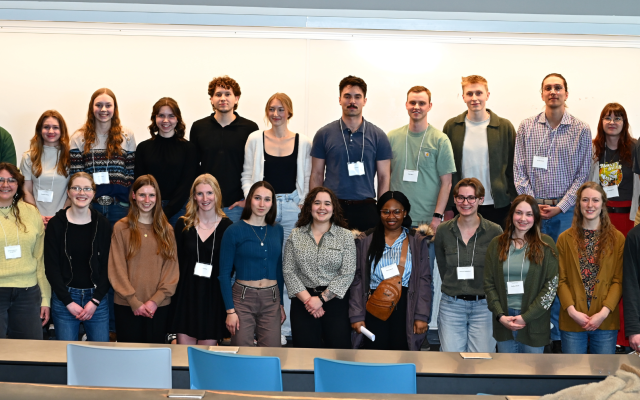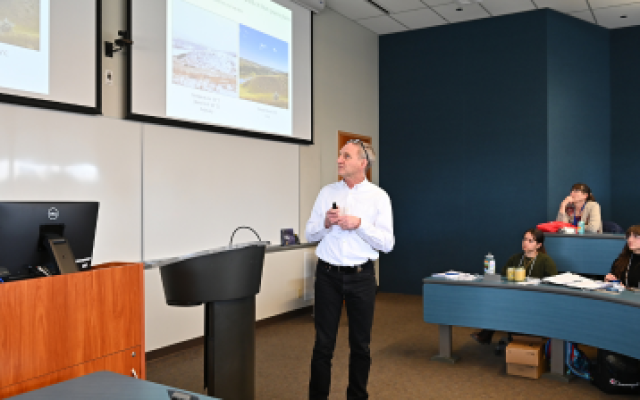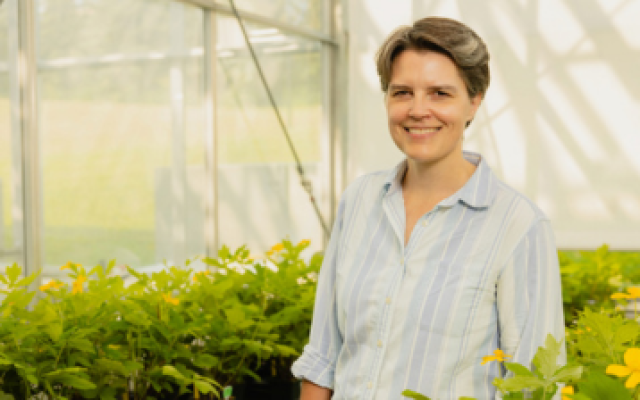RESEARCH. LIFE. EVOLUTION.
Biological sciences delve into the world of living organisms — from microbes, to human beings, to entire ecosystems. It is the science of life on, under and above earth.
The Department of Biological Sciences provides you with hands-on learning, moving you beyond textbooks and lectures to engaging research projects. Biology is a research-intensive science that can lead to a wide range of study areas, like environmental work, medicine, microbiology or agriculture. Exploring the nature of life leads biologists out into the world where they study how organisms interact with their environment, how they function and how they evolved over time.
Apply Now!
Department Highlights

Luke Stebbins Undergraduate Research Symposium Winter 2025
A Luke Stebbins Undergraduate Research Symposium was held Friday, April 7, 2025
Thirty abstracts were submitted. Presentations were organized into five oral sessions (judged). Approximately 70 people attended the event.
Prizes were awarded to six students:
Undergraduate Thesis (Session A):
First Place ($200) Jessenia Buzunis-Delagneau (Hoover Lab) for “Honey bee (Aphis mellifera) abundance does not influence floral niche overlap with bumble bee (Bombus) species”
Second Place ($100) Rylie Mooney (Logue Lab) for “Using machine learning to classify song types in multiple songbird species”
Independent Study presentations:
Session B1 ($100) Alex Frost (Flanagan Lab) for “A time series analysis of wetland characteristics following the continuous input of wastewater effluent”
Session B2 ($100) Rexelle Asis (Yevtushenko/Aboukaddour Labs) for “Tan spot of wheat virulence gene ToxB is located in a degraded Starship mobile element”
Session C1 ($100) Laura Pizzaro (Wiseman Lab) for “Effects of alizarin dye on embryonic development of Zebrafish (Danio rerio)”
Session C2 ($100) Courtlynd Cherpin (Schultz Lab) for “When the flower fails: mutants impairing auxin transport lead to a female reproductive defect”

Biological Sciences Graduate Research Symposium 2025
We had an excellent turn-out for the 2025 Biological Sciences Graduate Research Symposium Friday January 31, 2025. Dr. Roy M. Golsteyn kicked off the event with an interesting presentation entitled "Natural Products from Canadian Botanicals: Patterns and connection". This was followed by 11 oral student presentations and 7 student poster presentations. Approximately 50 people attended the event held in Markin Hall. The quality of the presentations was excellent, and judges had a challenging time selecting winners. The Graduate Student's Association provided funding for the event and the Dean's Office contributed to the prize money. A generous donation by Dr. Dan Johnson allowed us to offer third place prizes in addition to our standard first and second place prizes. The School of Graduate Studies provided toques and mitts for each presenter and the Hoover lab provided coveted U of L honey for each presenter.
Prizes were awarded to the following students:
$200 First Place - Oral Presentation:
Lauren Edison (Goater Lab) - Environmental conditions trigger a reversible host manipulation in Alberta's fluke-infected zombie ants"
$200 First Place - Poster Presentation:
Nick Schimpf (Yevtushenko Lab) - "A copper-tipped, peptide guided, precision missile for targeting plant pathogens"
$100 Second Place - Oral Presentation:
Carisa McGale (McCune Lab) - "Can distribution models effectively predict the distribution of a rare plant community in Waterton Lakes National Park?"
$100 Second Place - Poster Presentation:
Amy Wiedenfeld (McCune Lab) - "Effects of the environment on populations of the rare spotted wintergreen plant"
$50 Third Place - Oral Presentation:
Jaxon Reiter (Schultz Lab) - "Ovule defects in Arabidopsis auxin transport mutants drive drastic reductions in seed set"
$50 Third Place - Poster Presentation:
Navya Sehgal (Wiseman/Bogard Labs) - "Quantifying the effects of effluent loading and Prussian Carp invasion on food web dynamics in prairie lakes"
Many thanks to our judges (Dr. Kim Stanford, Dr. Melissa Chelak, Dr. Fairo Dekashu Foryuy, Dr. Neha Vaid, Dr. Tegan Barry, Dr. Robert Laird, Dr. Dan Johnson, Dr. Vicky Garcia Rodriguez, and Dr. Courtney MacInnis).
Thank you also to the Graduate Student organizing committee (Amy Wiedenfeld, Jemma Todoschuk, Carisa McGale, Rayen Morales Urrutia, Carmen Agenbacht and Carrigan Dawson) who helped us put on the event.

After the fire — how plant life is recovering following the Kenow wildfire
University of Lethbridge researchers have been monitoring plant life in Waterton Lakes National Park to see how they’re responding following the massive Kenow wildfire in 2017.
“We know we have increasing fires on the landscape recently, so plant communities are going to have to deal with that,” says Dr. Jenny McCune, a ULethbridge biology professor. “But then we also have increases in human-caused stressors like recreation. There’s a real question about how those two different sources of stress will interact and whether one will magnify the effects of the other.”
Jed Lloren, a master's student, and undergraduate field assistants David Musk and Kirsty McFadyen survey the plant community at a burned site.
In the second and third growing seasons after the fire, McCune and her students examined both burned and unburned plots that were originally surveyed in the mid-1990s to compare the plant species present. They wanted to know how plant life is being affected by stressors like wildfire and increased human presence.
School of Graduate Studies Medal of Merit Winner Jaxon Reiter
Shining Student Ash Mosabeb-Omran
Shining Student Annelise Den Hertog
Career Bridge: Centre for Work-Integrated Learning and Career Development

Put Your Knowledge to Work
Whether you’re looking for a more in-depth learning experience by assisting with research projects on campus or by testing your knowledge in a real-life work setting, we can help! The University of Lethbridge is proud to offer you an exceptional opportunity to explore professional development through academic programs and services designed to give you a competitive edge in a fast-changing world.
You have a bright future — experience it via Career Bridge at uLethbridge!
